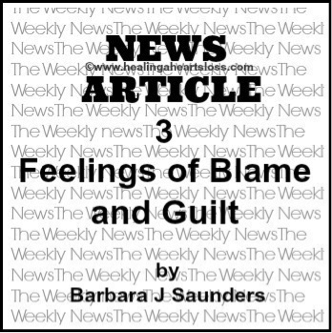In a “Coping with Grief” workshop a frequent acknowledgment is the feelings of blame and guilt. These feelings can be associated with sentiments such as; “I “should” have been the one to go (die)”, “Why did this happen to someone so young”, “What did I do wrong”, “If I hadn’t said the things I did, this would not have happened”, “God is punishing me” and I am certain you can think of more thoughts.
Grief brings with it a pot full of ingredients unique to each of us and once stirred the mixture can become a blend of emotions, fears, reactions, confusion, disbelief and more. Now, add blame and guilt to this. How is anyone able to make an informed decision or have a thought that is not related to what if, why, or how could this have been different?
Perhaps the “blaming” situation is made to be worse than it actually was. Sometimes, words are spoken out of frustration when emotions are close to the surface. Imagine when you feel and voice relief that someone has finally died after a long illness. Is this cause for blame and guilt?
You are alive and someone else has died; is this cause for guilt or blame? Perhaps you are reading this and saying “YES”. Are you looking at this situation from one point of view? Chances are there may be several different viewpoints from several different people who are able to evaluate the situation.
Is unfinished business, words left unsaid, apologies not made, “I love you” not said or regrets a reason for guilt or blame? This is for you to decide not anyone else. Sometimes, people have feelings of blame and guilt that arise when there is nothing else. When there is emptiness in the heart.
Is blame being put on another person? I know others will play the guilt and blame game and point the finger at anyone or any situation, but if the shoe doesn’t fit, don’t put it on.
How do you move beyond this to heal from a loss? First, know some people never move beyond the grief related to anger, guilt, and blaming. Second, we cannot make someone be better after a loss. Third, forgiveness of self and others is important. I say this knowing forgiveness can be one of the hardest things to do and the most healing.
I often hear the conversations with blame, guilt and more. This is almost, if not a form of torture; whether it is done by you to yourself or by someone else in any shape or form. By all means, be gentle with yourself and ease up on these aspects of grief and loss. No one wins at this game especially you.
Barbara Gillett Saunders
Grief Counsellor/Thanatologist

